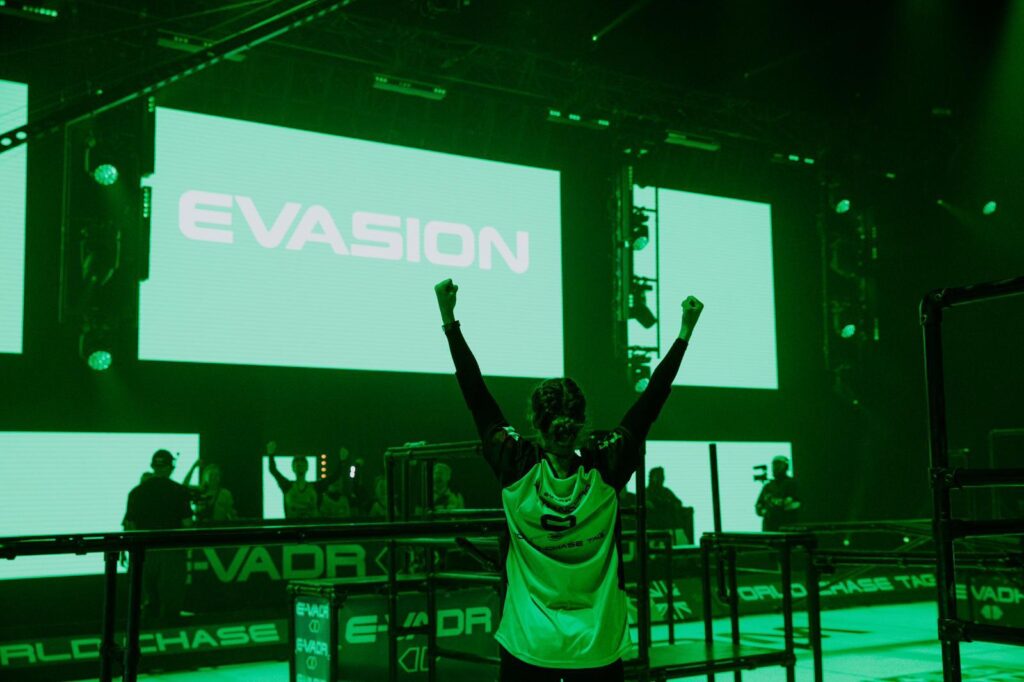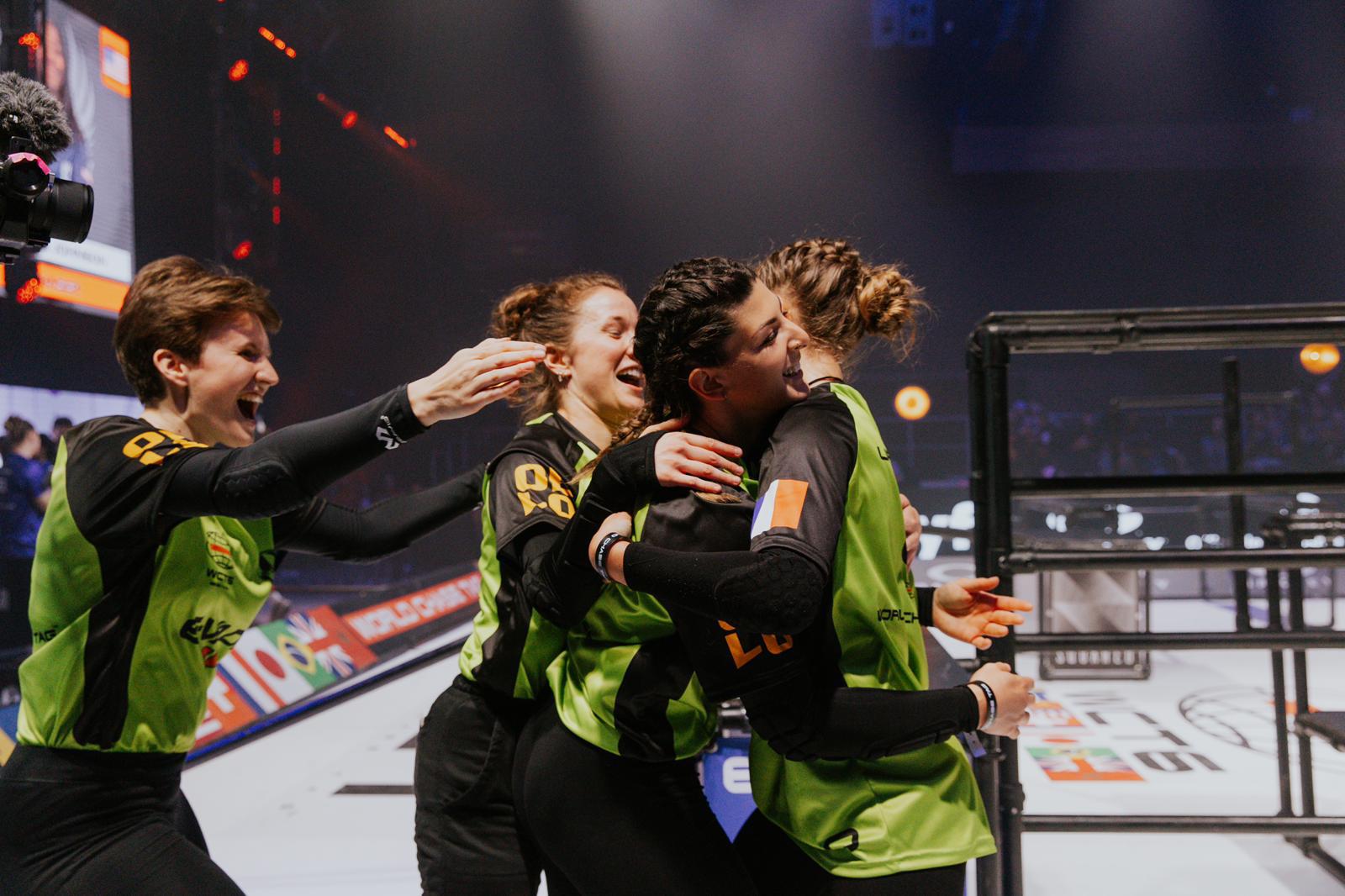Whether you’re a kid begging your parents to play for five more minutes, battling it out with your friends on the playground at school, or being forced into looking after a kid at the family function, we’ve spent hours playing the game that famously has no winner – but now it does. Here are the world’s best tag players explaining why their sport is catching on.
In 2011, a game of tag between father and son in their garden got them thinking. Why is this not a real sport? And so it began. The beginning of a 14-year journey that would end in global expansion, ESPN TV deals, and a regulated, structured competitive sport.
The premise and rules, although obviously more complicated than tag in its original form, are fairly simple. Chase Tag is played in a square arena called a quad, which has obstacles and barriers. Matches are between two teams of six athletes who compete in several one-on-one pursuits, where the ‘chaser’ has just twenty seconds to tag the ‘evader.’ Whoever wins the duel stays on as the next evader, and the match is best of 16.
Christian Devaux, the founder and CEO of World Chase Tag, 55, says, “Me and my son came up with the idea. We played a lot of tag in the garden. My son wanted to play it everywhere we went. As he got older, we started using more obstacles, and he started to think that he was better than me, so we came up with a way to monitor who won. We started using a timer and a referee. We both started realising that this would be really cool if real athletes started doing it.”
The pair set up a group in London and played using barrier tape around trees and obstacles around Hyde Park. When winter hit, they started renting gyms, designing courses, and holding proper events. By the beginning of 2016, the sport had gone viral.

“Our first two videos went viral with almost two million views. It just took off from there,” says Christian. “We saw the potential. We had proper parkour athletes taking place, so we knew it would be a good watch.”
One of these parkour athletes was Greg Ball, who joined after Christian and his brother, Damian, spoke to him about a new sport they were testing. Ball, and his team, Marrero Gang, won the first three World Chase Tag championships in 2016, 2017, and 2018.
“It started as a bit of fun. It was a side quest,” Marrero Gang’s former team captain, Ball, says. “I didn’t think it would blow up like it did. It’s been a strange journey from not believing it would go anywhere to believing it’s going to be the biggest thing in the world.
“We managed to win the first three chase tag competitions back-to-back, which gave us a legacy. I like to think it makes us pioneers of the sport. There were a few teams at the start, which made Chase Tag possible. It was when the French and the States came in that the sport began to be international, and it took off, but I would call myself and my team pioneers in the sport, and I would say we were one of the main driving influences of those first few years.
“We committed our lives to doing Chase Tag at that point. If we didn’t do that, then we wouldn’t have developed the rivalries and the competition needed to drive the sport into what it is today.”
World Chase Tag is now international, with gyms all over the world, including in Japan, China, India, Israel, South Korea, and Mexico. These gyms are permitted to use the World Chase Tag rules and branding, allowing the movement to spread all over the planet.
“Chase tag was hardly even a thing when I joined,” says Ball, who is also a previous finalist of the British TV show Ninja Warrior. “It was just a bunch of scaffolding. Now we’re having world competitions with teams from Brazil, Japan, and China, and it has honestly been insane to see the growth.
“I’m lucky enough to still participate by commentating. I get to go to these worldwide events knowing that at the first one there were literally 40 people watching in a small warehouse. Now, we are selling out stadiums. It’s mind-blowing to see how far it has come along.”
Ball was the first ever Knight of Flight, awarded to the best player at every tournament, which he also believes solidified his name in the hall of fame for World Chase Tag, along with some of the incredible athletes who are competing now.

When asked why Chase Tag had had such a rapid rise to fame, Christian Devaux says, “Some sports are entertaining to watch, some are entertaining to play. Everyone has played tag, but it’s also so entertaining to watch. It’s easy to understand, and you immediately know what’s going on. There’s skill and strategy in our sport, but it’s still simple to follow. That’s our superpower.
“It’s such a universal concept around the world. There is no association with a particular nation. It’s not an American sport or a Commonwealth sport. It’s tag.
“Dana White from UFC says if you were in the corner of the street watching people play football and basketball and a fight breaks out, everyone would stop watching and watch the fight. I would take that and say, If, during the fight, two people legged it past the fight chasing each other like their lives depended on it, everyone would start watching that instead.”
Read more about other niche and quirky sports here:
With Chase Tag on an upward trajectory, Christian and his team felt it was time to introduce the women’s game, with the first Women’s World Chase Tag Championships taking place in 2024.
Lea Marionett, the 25-year-old captain of the current and first-ever women’s world champions, French team Urban Corp Nano, says, “We only trained once or twice a week, and then we won our first competition, which was a local one in France. After this, everything changed. We trained five times a day, went to the gym six times a week, and managed to bring home the World Championship. We’re so proud of this and proud that women’s tag is taking off.”
Her best friend and teammate, Lea Marionett, has played the sport for five years and was one of the first women ever to train for Chase Tag. The Frenchwoman had ambitions of growing the women’s side of the game and set up the team Urban Corp Nano, building the team up to what it is today.
“I’m extremely proud that we won, but I’m equally proud of the sport and how we have helped the women’s side of it,” Marionett says.
“We hope that it becomes a mainstream sport. There’s talk of it being in the 2032 Brisbane Olympic Games. We’re just hoping that we will be fit to play the sport by then, but that could be very special.”
The sport is at an all-time high. The 2024 Chase Tag World Championships, held in Évry-Courcouronnes, France, saw Urban Corp Nano crowned as the first-ever women’s world champions, attracted almost 440,000 views on various platforms and had a live crowd of almost 6,000. The event saw a record-breaking 22 teams competing, including nearly 130 athletes from 10 countries, and Christian Devaux does not see it slowing anytime soon.
“I’m proud of how far the sport has come. The reason it has become this big is because of the whole community,” he says. “The athletes, the gyms. I don’t see a limit on how big it can get. People are watching less and less traditional sport. Kids aren’t watching 5 days of cricket or 90 minutes of football. We’ve designed our rules around that.
“People are brought up on tag. This is your sport. Over time, it will get bigger and bigger. It’s not bound by cultural limitations. More people have played tag than have played soccer. Not everyone in every country has played football, but everyone has played tag at some point in their life.”







